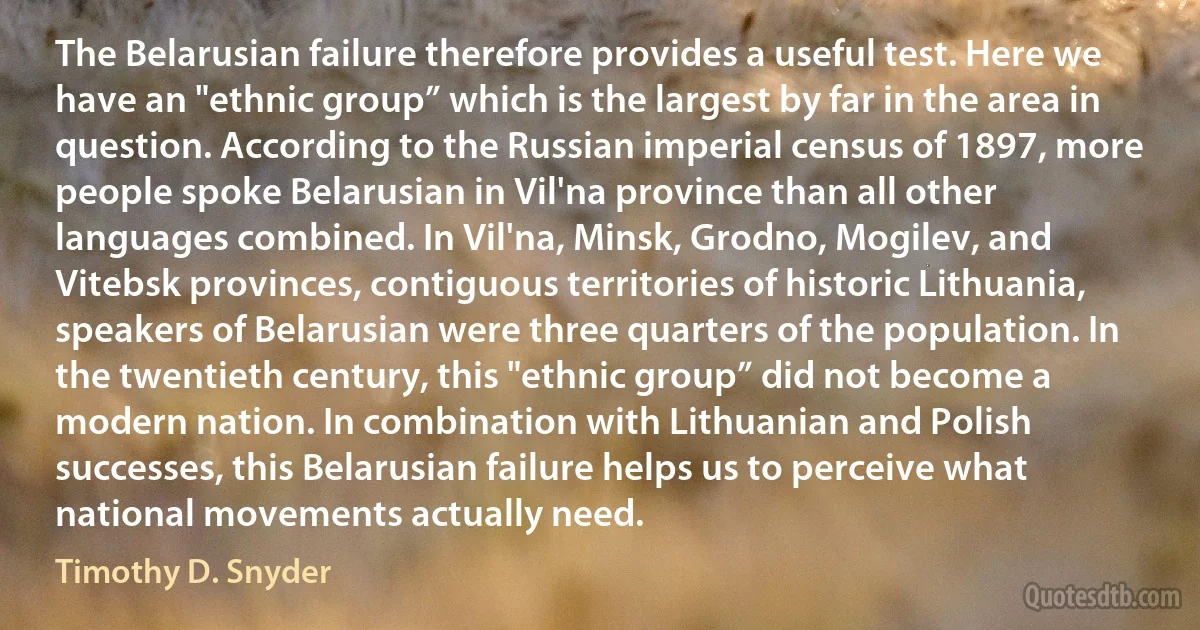
The Belarusian failure therefore provides a useful test. Here we have an "ethnic group” which is the largest by far in the area in question. According to the Russian imperial census of 1897, more people spoke Belarusian in Vil'na province than all other languages combined. In Vil'na, Minsk, Grodno, Mogilev, and Vitebsk provinces, contiguous territories of historic Lithuania, speakers of Belarusian were three quarters of the population. In the twentieth century, this "ethnic group” did not become a modern nation. In combination with Lithuanian and Polish successes, this Belarusian failure helps us to perceive what national movements actually need.
Timothy D. SnyderRelated topics
census century ethnic failure far historic imperial lithuanian nation national need people province question spoke three quarters lithuaniaRelated quotes
I have presented the periodic table as a kind of travel guide to an imaginary country, of which the elements are the various regions. This kingdom has a geography: the elements lie in particular juxtaposition to one another, and they are used to produce goods, much as a prairie produces wheat and a lake produces fish. It also has a history. Indeed, it has three kinds of history: the elements were discovered much as the lands of the world were discovered; the kingdom was mapped, just as the world was mapped, and the relative positions of the elements came to take on a great significance; and the elements have their own cosmic history, which can be traced back to the stars.

Peter Atkins
Even more! He had a unique talent for languages and did not have to learn any. He never did any courses! When he came back from France, he spoke French. He would quickly learn the language of any country he came to – Polish, Spanish, German, Russian... This came very easily to him. He never spent as much time to learn a language as, for example, I did. I envied my brother in this case. Moreover, he not only spoke nut also wrote. The French praised his French very much. His ear for music must have helped him. Besides, he had a good natural memory. Hence were his broad communication and a career growth.

Vasyl Slipak
I save myself in a church. Dark, empty. Lights flickering before icons. One sings everything that one has sung before in the past. Some black figures - and the heart is heavy. The tears take one's breath away and the past rises up again. Home.... in Peter's office [Marianne's brother, governor of Kovno Province, Lithuania], my entire soul starts to ache for him, for that battle for everything that is sweet and good, which is called Russian life. Empty, empty in the house, no one. Whoever comes - doesn't get his fill of him. And then such a heated rush of love rips out of the [visitor's] heart, begging one's pardon and forgetting the trouble behind, that the whole house swells.

Marianne von Werefkin
Capitalism did not defeat communism because capitalism was more ethical, because individual liberties are sacred or because God was angry with the heathen communists. Rather, capitalism won the Cold War because distributed data processing works better than centralised data processing, at least in periods of accelerating technological change. The central committee of the Communist Party just could not deal with the rapidly changing world of the late twentieth century. When all data is accumulated in one secret bunker, and all important decisions are taken by a group of elderly apparatchiks, they can produce nuclear bombs by the cartload, but not an Apple or a Wikipedia.

Yuval Noah Harari
.. the nineteenth-century Empire undeniably pioneered free trade, free capital movements and, with the abolition of slavery, free labour. It invested immense sums in developing a global network of modern communications. It spread and enforced the rule of law over vast areas. Though it fought many small wars, the Empire maintained a global peace unmatched before or since. In the twentieth century too it more than justified its own existence, for the alternatives to British rule represented by the German and Japanese empires were clearly far worse. And without its Empire, it is inconceivable that Britain could have withstood them.

Niall Ferguson
